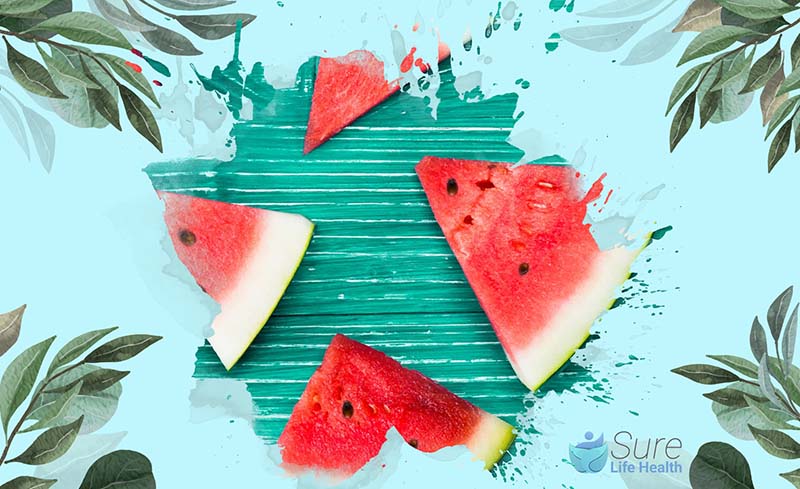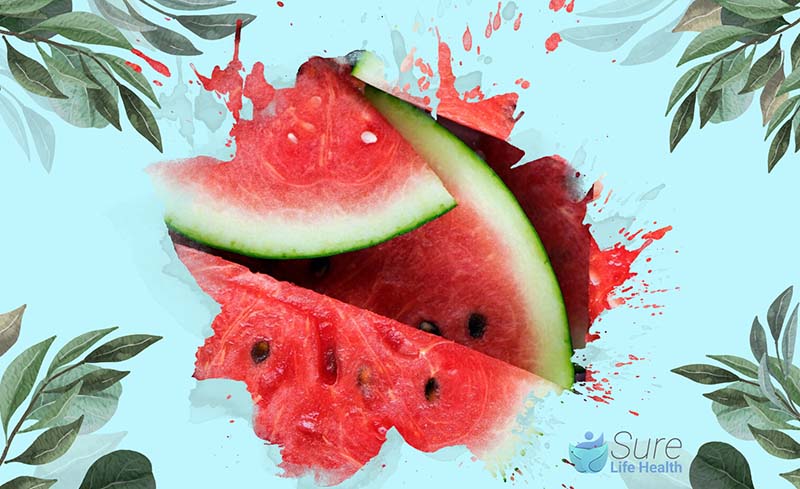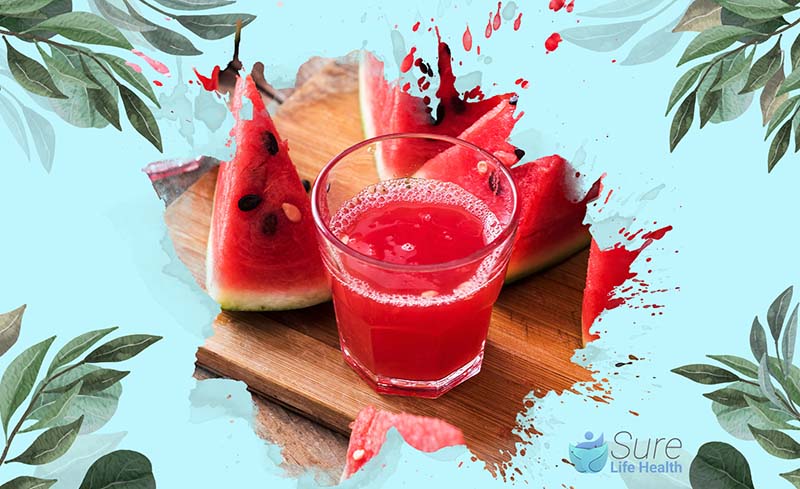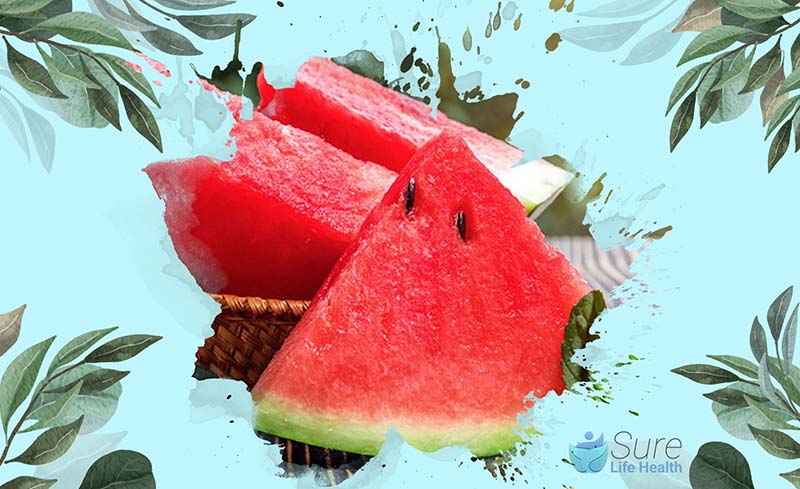Watermelon, first cultivated in northeastern Africa over 4000 years ago, is celebrated for its juicy sweetness. This fruit, known for its vibrant red flesh encased by a green rind, is more than just a delightful treat; it’s a nutrient powerhouse.
It is packed with vitamins A and C, is rich in antioxidants, and is often cited as a natural aphrodisiac, making it beneficial for sexual health. Let’s explore how adding watermelon to your diet can enhance your sexual well-being. Keep reading to discover the full range of benefits watermelon offers in this regard.
Is Watermelon Good for Erectile Dysfunction?
Definitely! Watermelon contains citrulline, a natural amino acid that may contribute to better erections.
Viagra operates by enhancing blood circulation to the penis, facilitating easier erections when arousal occurs. Citrulline, on the other hand, functions differently from Viagra but may yield similar results.
Initial studies indicate that the body could convert citrulline into another amino acid known as arginine. Arginine, in turn, converts into nitric oxide, a compound that widens blood vessels, thereby enhancing blood flow to the penis and potentially improving erections.

Nutritional Value of Watermelon
Watermelon not only satisfies your sweet tooth but also offers a nutritious and delicious option.
In just one cup of watermelon, you’ll find:
- 46 calories
- 12 grams of carbohydrates
- 865 international units (IU) of vitamin A (equivalent to 0.26 milligrams)
- 12 milligrams of vitamin C
- 170 milligrams of potassium
- 0.1 milligrams of vitamin B6
- Zero fat, cholesterol, or sodium
Vitamin A not only promotes skin and eye health but also works alongside vitamin B6, which is key in protein breakdown and crucial for both immune and nerve function.
Vitamin C strengthens the immune system and improves iron absorption, whereas potassium plays a vital role in blood pressure regulation and nerve support.

Additional Sexual Health Benefits of Watermelon
Increases Sexual Desire
Watermelon contains antioxidants like lycopene and beta-carotene, which may promote hormone balance, crucial for maintaining a healthy sex drive in both men and women.

Improves Blood Flow
By aiding heart health and lowering blood pressure, watermelon supports improved blood circulation. Potassium in watermelon enhances blood vessel flexibility, reducing stress on the heart and potentially enhancing sexual performance.
Additionally, the ability to prevent artery hardening of watermelon may lower the risk of blood clots, strokes, and heart attacks.

Supports Stress Reduction
Watermelon’s magnesium and potassium content can help reduce stress levels by calming nerves. Its high-water content aids hydration, potentially boosting overall mood and relaxation.

Enhances Workout Performance
The presence of L-citrulline in watermelon can enhance workout performance by increasing oxygen supply to muscles and reducing muscle fatigue during and after exercise.

Helps Reduce Blood Pressure
L-citrulline in watermelon may contribute to reducing blood pressure by promoting nitric oxide production, which widens blood vessels and improves blood flow. While promising, further large-scale research is needed to confirm this benefit.
Boosts the Nerve Function
Watermelon is rich in potassium and choline, vital for regulating nerve function and facilitating efficient electrical impulses. This can lead to improved muscle movement, learning, and memory.
Hydration Benefits
With its high-water content of 92%, watermelon is not only synonymous with summer but also offers excellent hydration. Packed with antioxidants, essential nutrients like vitamins A and C, magnesium, fiber, and lycopene, it’s a refreshing and healthful choice for overall well-being.
Side Effects of Eating Watermelon
While watermelon offers numerous health benefits, it’s important to be aware of potential side effects:
Digestive Discomfort from Lycopene: Overindulging in watermelon, rich in lycopene, can cause digestive issues, including nausea, loose stools, heartburn, and inflammation.
Blood Sugar Level Concerns: Watermelon’s natural sugars and high glycemic index warrant cautious consumption by individuals with diabetes. Juicing watermelon is particularly discouraged as it strips away fiber, facilitating quicker sugar absorption and potentially spiking glucose levels.
Allergic Reaction Risk: Though uncommon, watermelon can trigger allergic reactions in some, marked by hives, swelling, and breathing difficulties. In extreme cases, this can escalate to anaphylaxis, a potentially fatal condition.
How Much Watermelon is Too Much?
In terms of its impact on blood sugar levels, a 4-cup (608-gram) serving of watermelon contains a high glycemic index level and provides 46 grams of carbs, with 36 grams from sugar. This can cause a spike in blood sugar levels.
To maintain a safe sugar intake, the U.S. Department of Agriculture (USDA) recommends consuming about 2 cups of fruit per day for individuals following a standard 2,000-calorie diet, which equates to approximately 300 grams of watermelon.

How to Include Watermelon in Your Diet
If you’re looking for creative ways to incorporate watermelon into your diet, here are some unique ideas:
- Watermelon Smoothie: Blend watermelon chunks with ice, lime juice, and mint leaves for a refreshing and nutritious smoothie. Add Greek yogurt for probiotics, making it an ideal snack or breakfast option.
- Watermelon Salad: Combine diced watermelon with cucumber, feta cheese, and mint leaves to create a refreshing salad with a perfect balance of sweet and savory flavors. It’s an excellent side dish for summer BBQs or a light and healthy lunch option.
- Grilled Watermelon: Slice watermelon into thick slices and grill them for a few minutes on each side. Drizzle with balsamic glaze, sprinkle with salt, and add a touch of olive oil for a unique and flavorful side dish or dessert.
- Watermelon Salsa: Dice watermelon and combine it with tomatoes, red onion, jalapeno pepper, cilantro, and lime juice to create a sweet and spicy salsa. Enjoy it as a dip with tortilla chips or use it as a marinade for grilled chicken or fish.
- Watermelon Sorbet: Make a healthy and delicious watermelon sorbet by pureeing watermelon chunks in a blender and freezing the mixture. This vegan and gluten-free dessert option is perfect for those with dietary restrictions and offers a refreshing treat on hot summer days.
By trying out these innovative recipes, you can enjoy the sweetness and freshness of watermelon in various delightful ways, adding a burst of flavor and nutrition to your meals.
Who Should Not Eat Too Much Watermelon?
While watermelon itself is generally safe to consume, individuals with specific allergies should exercise caution:
- Pollen Allergy Sufferers: Those with pollen allergies, particularly to grass pollen, should be mindful when consuming watermelon. Some individuals with grass pollen allergies may experience allergic reactions to raw fruits and vegetables, a condition known as oral allergy syndrome (OAS). While OAS typically results in mild symptoms like a skin rash, in rare cases, it can lead to more severe reactions such as breathing difficulties. It’s advisable to take extra precautions during grass allergy season to avoid potential reactions.
- Asthma Patients: Individuals with asthma should consult their healthcare provider before consuming watermelon or any other supplements. Seeking advice from a doctor can help ensure safe consumption, especially if there are concerns about potential allergic reactions or exacerbation of asthma symptoms.

Conclusion
Seeking a natural remedy to improve erectile dysfunction or boost your sex life? Watermelon is often highlighted as a libido-enhancing fruit. Yet, it’s important to understand that erectile dysfunction can be caused by underlying health issues like high blood pressure and cholesterol. Solely depending on watermelon for libido improvement might not be a comprehensive solution.
Watermelon is celebrated as a natural alternative to Viagra for men, providing numerous health benefits beyond enhancing sexual wellness. Adding this nutritious fruit to your daily diet can boost overall health.
Regarding consumption, experts generally suggest 1-2 glasses of watermelon juice daily to achieve citrulline levels similar to Viagra. By consuming watermelon in moderation, you can enjoy its benefits, refreshing taste, and nutritional content.
Be sure to explore more insightful blogs from Sure Life Health, where we continue to shed light on the latest trends and breakthroughs in health and wellness.
Professor Gaye Cunnane, PhD, MB, FRCPI
As the Director of Health and Wellbeing at RCPI, Professor Gaye Cunnane is at the helm of initiatives aimed at enhancing the health and well-being of RCPI Trainers and Trainees. Her role extends beyond administration; she is also a respected clinical professor of rheumatology and a consultant rheumatologist at Trinity College Dublin (TCD) and St James’s Hospital. Prof. Cunnane’s medical journey began at TCD, where she graduated from medical school, and her path has been marked by both clinical and academic excellence.
After completing her basic clinical training in medicine, she embarked on PhD studies at University College Dublin and St Vincent’s University Hospital. Her research during this period was focused on prognostic markers in early inflammatory arthritis, a project that saw her collaborating with esteemed universities across Europe, including in Switzerland, The Netherlands, the UK, and Sweden.
Prof. Cunnane’s career took her to the University of California, San Francisco, where she spent three years delving into research on new treatments for lupus. Her academic prowess led her to the University of Leeds in 2001 as a senior lecturer, before returning to Ireland in 2003 to assume her current roles. She has also served as the National Specialty Director for Rheumatology training in Ireland, Programme Director for Basic Specialist Training with RCPI, and as a past President of the Irish Society for Rheumatology.
PUBLISHED ARTICLES
“Rheumatic disease differentiation using immunoglobulin G sugar printing by high-density electrophoresis”: Published in The Journal of Rheumatology, this study reflects her in-depth investigation into rheumatic diseases.
“Benefits of exercise in patients with rheumatoid arthritis: a randomized controlled trial”: This research work, highlighting the positive impact of exercise on rheumatoid arthritis, underscores Prof. Cunnane’s dedication to practical, patient-centered research.
Additionally, Prof. Cunnane has made notable contributions to the Annals of the Rheumatic Diseases, discussing early referral, diagnosis, and treatment of rheumatoid arthritis. She has also been involved in a study on the NCBI platform investigating exercise benefits in rheumatoid arthritis patients.
Professor Gaye Cunnane’s career is a testament to her commitment to improving patient outcomes in rheumatology through rigorous research, clinical excellence, and dedicated teaching. Her work continues to influence the field of rheumatology, both in Ireland and internationally.

